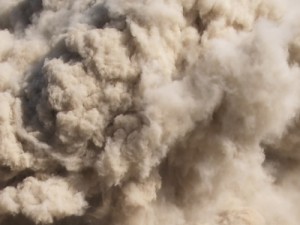How to Avoid Industrial Vacuum Explosions
 Are vacuums in your facility at risk of exploding? For most companies, the answer is a firm “no”. But here’s the problem: It only takes a single outlier to turn your shop floor into something resembling a war zone.
Are vacuums in your facility at risk of exploding? For most companies, the answer is a firm “no”. But here’s the problem: It only takes a single outlier to turn your shop floor into something resembling a war zone.
Vacuum Explosions Suck
In the United Kingdom, a Staffordshire research and development company found out first-hand just how dangerous industrial vacuums can be when the right chemicals are given time to mix. It all started on a Friday; employees used the wet-vac to clean up some aluminum powder on the shop floor. The machine wasn’t cleaned out and stood all weekend in a corner, giving ample time for the aluminum powder to react with water inside the machine and create hydrogen gas. And since hydrogen is highly flammable when exposed to a spark, Monday morning came with a surprise when the machine was turned on: BOOM!
The result? Significant burns to the employee’s face and torso, followed by a hospital stay and missed work. The company, meanwhile, was fined almost $10,000 and ordered to pay a similar amount in damages for failing to properly assess the risks of working with dangerous substances and vacuum tools.
A statement from Health and Safety Executive (HSE) inspector Wayne Owen noted that “this type of vacuum was not suitable for use with aluminum powder. Had the company paid attention to the instructions for working with this metal powder, or indeed the machine itself, then the incident could have been prevented.” Ouch.
Opting Out of the Explosion
Think this doesn’t apply to your company? Think again; according to the OHSA, “A combustible dust explosion hazard may exist in a variety of industries, including: food (e.g., candy, starch, flour, feed), plastics, wood, rubber, furniture, textiles, pesticides, pharmaceuticals, dyes, coal, metals (e.g., aluminum, chromium, iron, magnesium, and zinc), 3D welding (a form of 3D printing), and fossil fuel power generation. The vast majority of natural and synthetic organic materials, as well as some metals, can form combustible dust.”
In other words, if anything in your facility makes dust, you’ve got an explosion risk. Even worse, you’ll often get a secondary explosion when accumulated dust is tossed into the air and then ignited by the blast wave.
The solution? You’ve got a few options. First, keep your facility as dust-free as possible and always clean vacuums immediately after use. Or consider investing in an explosion-proof vacuum on the off chance something goes wrong—better safe than scorched.
Next Steps:
- Subscribe to our blog to stay informed about the latest HVAC news and insight.
- Stay up to date on facility maintenance tools such as chiller tube cleaners, boiler tube cleaners, hose/pipe cleaners, descaler systems, industrial vacuums, commercial pressure washers, and drain cleaners.

